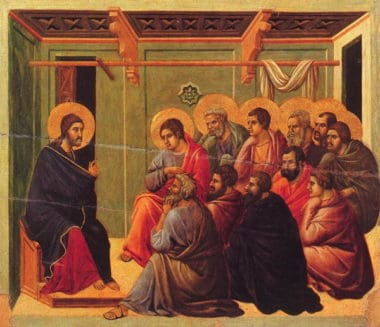The New Commandment
Presence of God – O Jesus, grant me the grace to understand Your new commandment, the commandment of fraternal charity.
MEDITATION
The commandment “Thou shalt love thy neighbor as thyself” (Matthew 22:39), requires strong, solid virtue, but it does not yet reach the greatest perfection of love. The highest ideal was proposed to us by Jesus shortly before His death, in those last moments in which He recommended to His dear ones what He had most at heart: “A new commandment I give unto you … as I have loved you, that you also love one another…. This is My commandment, that you love one another, as I have loved you” (John 13:34 – 15:12). In these words, Jesus raised the precept of charity to a truly new perfection: that of loving others, not only as we love ourself, but as He loves us and as He loves them. This perfection was  so dear to Him that He called it His commandment, the commandment which He most loved and the observance of which was to be the unfailing mark of His closest friends: “By this shall all men know that you are My disciples” (John 13:35). With a master stroke, Jesus made us pass from one standard of charity to the other—from the high, certainly, but still too human one, based on our love of self to the divine standard based on God’s infinite love for us. It is no longer a question of fixing our eyes on the love we have for ourself, in order to nourish a similar love for our brethren, but one of fixing our gaze infinitely higher, on the heart of Christ, the heart of God, to penetrate the secret of His infinite love for men that we might emulate it. Our fraternal charity will not be perfect until it becomes the reflection, or better still, the continuation of the love of Jesus for each of His creatures. We must try to love each one of our companions—even the least congenial, even those who do not love us—as Jesus loves him. And Jesus loves him so much that He has given His life for him; so much, that every day He renews this immolation for him on the altar, and for him remains truly present in the Eucharist, ever ready to nourish him with His immaculate Flesh. What excuse can we find for our lack of charity toward our neighbor when we compare it with the charity of Jesus?
so dear to Him that He called it His commandment, the commandment which He most loved and the observance of which was to be the unfailing mark of His closest friends: “By this shall all men know that you are My disciples” (John 13:35). With a master stroke, Jesus made us pass from one standard of charity to the other—from the high, certainly, but still too human one, based on our love of self to the divine standard based on God’s infinite love for us. It is no longer a question of fixing our eyes on the love we have for ourself, in order to nourish a similar love for our brethren, but one of fixing our gaze infinitely higher, on the heart of Christ, the heart of God, to penetrate the secret of His infinite love for men that we might emulate it. Our fraternal charity will not be perfect until it becomes the reflection, or better still, the continuation of the love of Jesus for each of His creatures. We must try to love each one of our companions—even the least congenial, even those who do not love us—as Jesus loves him. And Jesus loves him so much that He has given His life for him; so much, that every day He renews this immolation for him on the altar, and for him remains truly present in the Eucharist, ever ready to nourish him with His immaculate Flesh. What excuse can we find for our lack of charity toward our neighbor when we compare it with the charity of Jesus?
COLLOQUY
“In the Old Law, when You told Your people to love their neighbor as themselves, You had not yet come down upon earth, and knowing full well man’s strong love of self, You could not ask anything greater. But when You gave Your Apostles a new commandment—Your commandment—You not only required us to love our neighbor as ourselves, but would have us love even as You do, and as You will do until the end of time.
“O my Jesus! You never ask what is impossible: You know better than I how frail and imperfect I am; You know that I shall never love my sisters as You have loved them, unless You love them Yourself within me, my Jesus. It is because You desire to grant me this grace, that You have given a new commandment, and dearly do I cherish it, since it proves to me that it is Your will to love in me all those that You bid me love!
“When I show charity toward others I know that it is You who are acting within me, and the more closely I am united to You, the more dearly I love my sisters” (Thérèse of the Child Jesus, Story of a Soul, 10).
“O Christ, Your words form a new canticle: ‘A new commandment I give unto you!’ And what else does this Your commandment contain but love and charity; You wish us to love others as You, who are Love, love them! You say to us, ‘Love them as I have loved you,’ not ‘as I love Myself,’ for whereas You exercised justice upon Yourself, You have loved us in an act of mercy, meekness, and infinite compassion; and You wish us to love others in the same way” (St. Mary Magdalen dei Pazzi).
+
 Note from Dan: These posts are provided courtesy of Baronius Press and contain one of two meditations for the day. If you would like to get the full meditation from one of the best daily meditation works ever compiled, you can learn more here: Divine Intimacy. Please honor those who support us by purchasing and promoting their products.
Note from Dan: These posts are provided courtesy of Baronius Press and contain one of two meditations for the day. If you would like to get the full meditation from one of the best daily meditation works ever compiled, you can learn more here: Divine Intimacy. Please honor those who support us by purchasing and promoting their products.
Art: Christ Taking Leave of the Apostles, Duccio di Buoninsegna, between 1308 and 1311, PD-US author’s life plus 100 years or less, Wikimedia Commons; Father Gabriel of St. Mary Magdalen, mirror from open source material.




